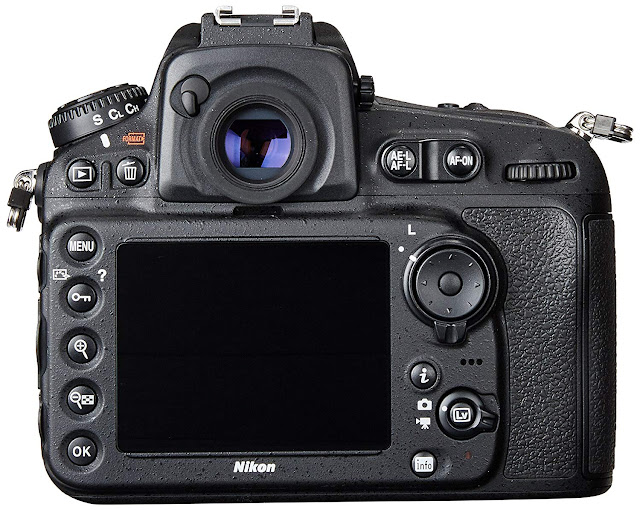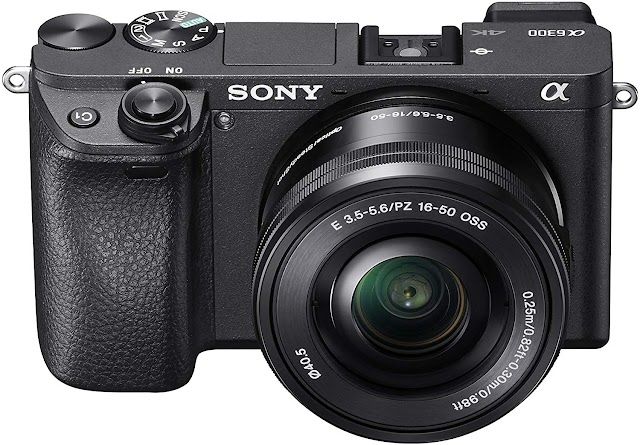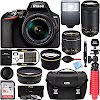The appearance of the D810 is a new breakthrough from Nikon which also provides an upgrade from the D800. Although equipped with a 36.3 megapixel resolution that is the same as its predecessor, the latest technology has also been pinned.
Like new sensors with an original ISO range that is expanded and equipped with significant improvements to the camera's features. This time Nikon pinned their best DSLR camera with EXPEED 4 image processing engine for its performance.
This processor is supported by a 36.3 megapixel full-frame CMOS sensor so that the results of DSLR camera photos will look battle. In addition, the ability to record videos has also been improved. Now the camera can take Full HD 1080 / 60p video.
Since the launch of the Nikon D800 camera with a 36.3 megapixel high resolution full-frame sensor, Nikon has finally upgraded their latest camera with the latest features. This is a DSLR camera with a 36.3 megapixel full-frame CMOS sensor that offers the best photo results.
That's because Nikon also equipped it with an EXPEED 4 image processor. Interestingly, the Nikon D810 completely eliminates Optical Low Pass Filters (OLPF). Even though there is no low pass filter on the D810, that does not mean that there is no stack of filters at all.
By removing OLPF, the D810 produces mid-frames and sharper angles with multiple lenses. Especially the 85mm f / 1.4G Nikkor and 85mm f / 1.8G camera lenses. You could say the best improvement in the D810 is the EXPEED 4 processor which is 30% faster.
The ability of this processor will affect the speed of the autofocus which is much faster to obtain initial focus and track moving subjects. With this processor, continuous shooting capabilities at full resolution up to 5 fps and 7fps in DX format.
D810 buffer capacity has also been increased and can shoot more raw files. Now the camera can shoot 47 12-bit uncompressed raw files and 23 uncompressed 14-bit raw files. The standard range is now ISO 64 to 12,800, can be extended to 51,200 equivalent.
Not only that, now the D810 also has the sRAW format. D810 is the second Nikon camera after D4S to get this format. As expected from a DSLR camera, autofocus speed is very good.
Especially if you don't use Live View mode, which limits the Nikon D810 to contrast detection autofocus. According to the Nikon D810 review of Indonesia, the camera uses the same engine as the D4S, Multi-Cam 3500FX. This is a 51 point focus system.
This system also has 15 cross focus points. With this cross focus point, the contrast detection system can analyze contrast differences along the horizontal and vertical axes. In lighting performance, Nikon D810 responds to very fast light changes even in low light conditions.
So the results of the Nikon D810 still have a sharp color. Another positive change is the LCD screen. To complete the Nikon D810 specification, a 3.2-inch LCD has been installed. Although the screen size remains the same, the resolution has increased from 921K dot to 1,229K dots.
Then there is also the optical eye pentaprism viewfinder. This viewfinder provides around 100% vertical and horizontal coverage of the frame in FX mode and 97% coverage in crop DX or 1.2x mode. In OVF, Nikon has improved the display info screen to OLED screens to increase visibility, as in the D7100.
Full HD recording has also been upgraded to 60 fps and the D810 now comes with many choices for filmmakers. In fact, Nikon pushed the D810 for videography needs. Thanks to the many choices of video recording and recording of recordings simultaneously to memory cards and external devices.
Nikon now even bundles a special "filmmaker", which includes an external video recorder Atomos Ninja 2. Unfortunately, there is no 4K support, which is quickly becoming a standard in videography. Moving to the camera side, the memory card on the right side of the camera still has a Secure Digital and CompactFlash card slot.
On the left side of the camera, there is a 3.5mm mic jack, 3.5mm headphone jack, USB 3.0 port and Type-C Mini HDMI port - the cover for this port is now individual. Although many experienced improvements, but Nikon does not include the Wi-Fi feature into the D810.
As one of the best DSLR cameras with high resolution, many photographers who give hope for D810 performance are good. Seeing there are some discarded features such as Wi-Fi and Optical Low Pass Filter (OLPF). But it seems that Nikon is indeed able to provide a breakthrough that without these two features, the D810's performance is still okay.
Talking about the price of the Nikon D810 this camera is sold into 2 variants. For body only, the camera is sold at a price of 32 million. Whereas the Kit 24-120mm lens is priced at 40 million. As a camera intended for professionals, it's natural that the D810 is quite expensive.
Full Specifications of Nikon D810
| General | |
|---|---|
| Brand | Nikon |
| Model | Nikon D810 |
| Announced | 2014-06-26 |
| Body Type | Mid-size SLR |
| Lens | |
| Manual Focus | |
| Lens Mount | Nikon F |
| Number of Lenses | 302 |
| Focal Length Multiplier | 1� |
| Macro Focus Range | n/a |
| Screen | |
| Screen Type | Fixed Type |
| Screen Technology | TFT-LCD (WRGB) |
| Screen Size | 3.2" |
| Screen Resolution | 1,229k dots |
| Live View | |
| Touch Screen | |
| Viewfinder | |
| Viewfinder | Optical (pentaprism) |
| Viewfinder Resolution | no electronic viewfinder |
| Viewfinder Coverage | 100% |
| Viewfinder Magnification | 0.7 |
| Photography Features | |
| Min Shutter Speed | 30s |
| Max Shutter Speed | 1/8000s |
| Continuous Shooting | 5.0 fps |
| Shutter Priority | |
| Aperture Priority | |
| Manual Exposure Mode | |
| Exposure Compensation | Yes |
| Custom White Balance | |
| Image Stabilization | |
| Built-in Flash | |
| Flash Range | 12.00 m (at ISO 100) |
| Max Flash Sync | 1/250s |
| Flash Modes | Front-curtain sync, slow sync, rear-curtain sync, redeye reduction, redeye reduction w/slow sync, slow rear-curtain sync |
| External Flash | |
| AE Bracketing | |
| WB Bracketing | |
| Exposure Modes | |
| Multi-Segment | |
| Average | |
| Spot | |
| Partial | |
| AF-Area | |
| Center Weighted | |
| DxO Sensor Scores | |
| DxO Overall Score | 97 |
| DxO Color Depth | 25.7 |
| DxO Dynamic Range | 14.8 |
| DxO Low Light ISO | 2853 |
| Sensor | |
|---|---|
| Sensor Type | CMOS |
| Sensor Size | Full frame |
| Sensor Dimensions | 35.9 x 24 mm |
| Sensor Area | 861.60mm2 |
| Sensor Resolution | 36 megapixels |
| Max Image Resolution | 7360 x 4912 |
| Max Native ISO | 12,800 |
| Max Boosted ISO | 51200 |
| Min Native ISO | 64 |
| Min Boosted ISO | 32 |
| RAW Support | |
| Autofocus | |
| AF Touch | |
| AF Continuous | |
| AF Single | |
| AF Tracking | |
| AF Selective | |
| AF Center | |
| AF Multi Area | |
| AF Live View | |
| AF Face Detection | |
| AF Contrast Detection | |
| AF Phase Detection | |
| Number of Focus Points | 51 |
| Number of Cross Focus Points | 15 |
| Video Features | |
| Video Resolutions | 1920 x 1080 (60p, 50p, 30p, 25p, 24p), 1280 x 720 (60p, 50p) |
| Max Video Resolution | 1920 x 1080 |
| Video Formats | MPEG-4, H.264 |
| Microphone Port | |
| Headphone Port | |
| Connectivity | |
| Wireless Connectivity | Optional |
| HDMI | |
| USB | USB 3.0 (5 GBit/sec) |
| Physical | |
| Environmental Sealing | |
| Water Proof | |
| Dust Proof | |
| Shock Proof | |
| Crush Proof | |
| Freeze Proof | |
| Weight | 980g |
| Physical Dimensions | 146 x 123 x 82mm |
| Battery Life | 1200 shots |
| Battery Type | Battery Pack |
| Battery Model | EN-EL15 |
| Other Features | |
| Self Timer | Yes (2, 5, 10, 20 secs for up to 9 shots) |
| Timelapse Recording | |
| GPS | Optional |
| Storage Type | SD/SDHC/SDXC, CompactFlash (UDMA compliant) |
| Storage Slots | 2 |








0 Comments